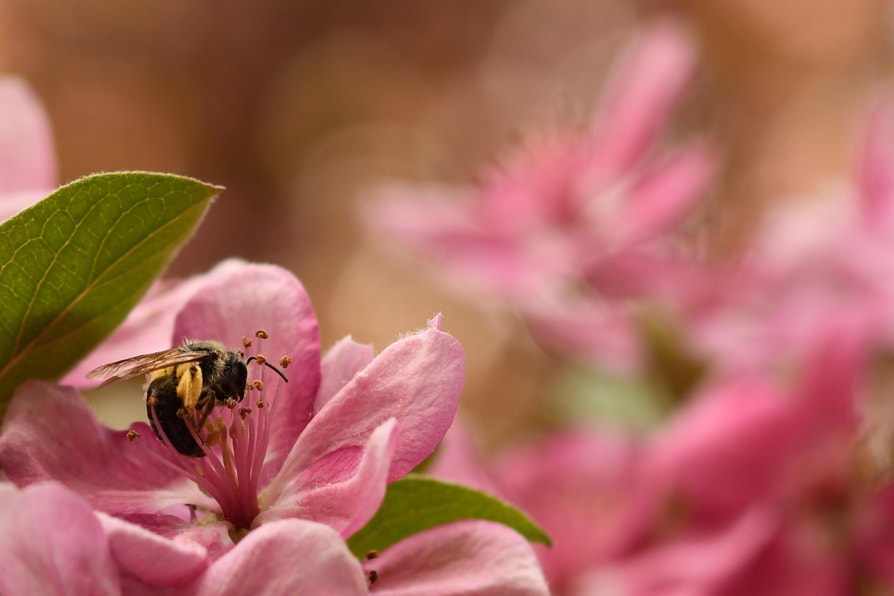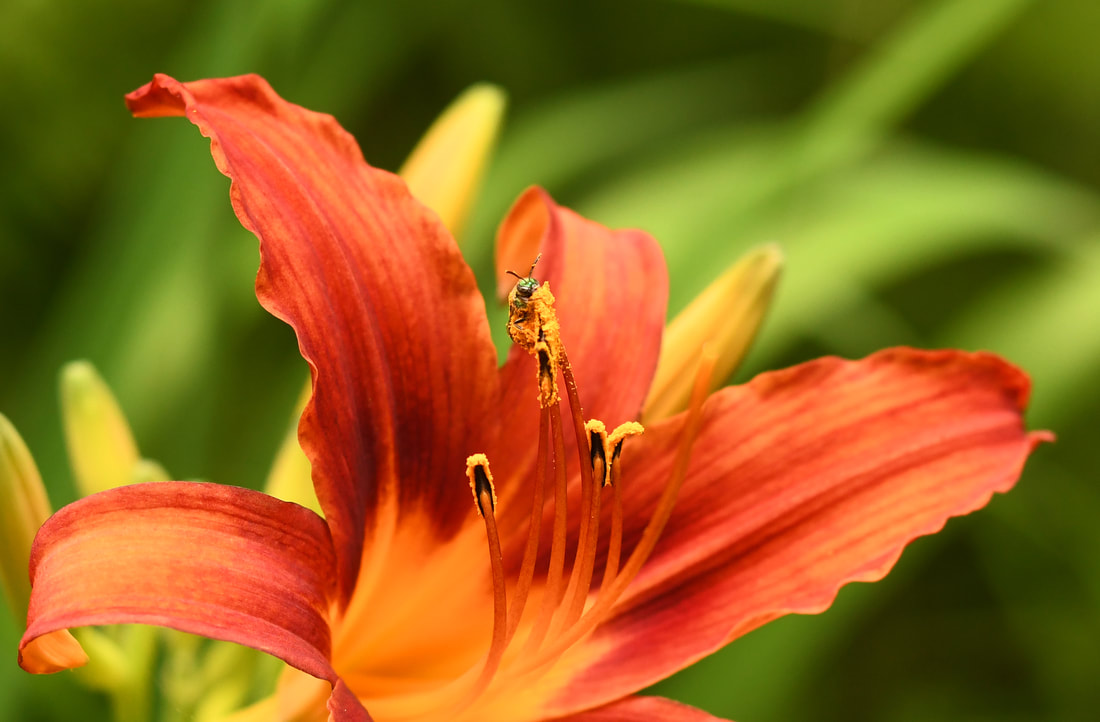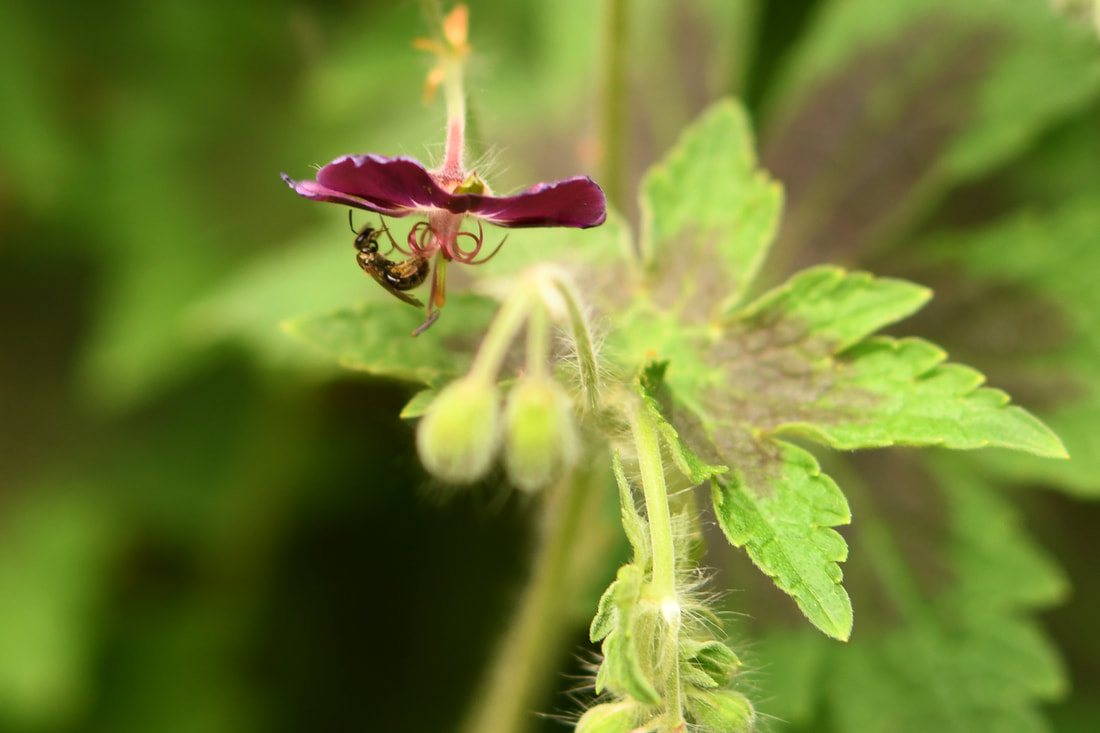My first memory of bees was not a happy one. As a child running barefoot through a sprinkler in my backyard, I inadvertently stepped on a honey bee and was shocked at the pain of the sting. My mother put mud on the scary, white blotch with a red center and made me feel better--at least psychologically. Ammini Moorthy, our hard working GGC Scholarship Chair, was given a very different treatment for bee stings. She grew up on a farm in a remote village in the foothills of the Western Ghats in Kerala in India. When she got stung by a bee, her dad would take her to the cow shed and let the cow lick her sting. The sandy texture of the cow’s tongue removed the stinger in no time. Ammini has sweet childhood memories of bees too. Bees would form hives high up in the trees in her village. A honey extractor would climb up and harvest honey as everyone watched below. The entire village shared the tasty treat.
My son Glen had an interesting first encounter with a honey bee when he was five years old. I noticed him bending over a flower and asked him what he was doing. He told me he was “patting a bee,” I was horrified until I saw that he was indeed successfully patting a docile bee. He had watched an episode of the Children’s Television Network program 3-2-1 Contact, about bees and pollination and he did a little research on his own. Not surprisingly, Glen grew up to become a scientist and works for the Broad Institute in Cambridge, Massachusetts. (Excuse the proud Mom brag :-)
Our club was lucky enough to have Troy Hall, a commercial beekeeper from nearby Plainfield, New Hampshire, talk to our members at our monthly meeting last Friday. If you missed it and would like hear his entire presentation, go to granthamgardenclub.org and find it under Presentations. I enjoyed watching it last night and highly recommend you give it a look.
Troy practices sustainable, pesticide free beekeeping. Half of Troy’s hives are dedicated to raising queen bees that beekeepers from all over the country purchase. These queen bees have proven their hardiness by surviving at least one of our harsh winters. A queen bee lays between 175,000 to 200,000 eggs each year with those offspring inheriting her strong genes and contributing to Troy’s success. Although he calls his a small apiary, Troy sells 15,000 pounds of honey a year. I picked up a jar of Hall Apiaries Grade A (Unheated/Raw) Honey at Rum Brook Market and now I’m hooked on his incredible product.
If we didn’t know it before, we now know from Troy how crucial bees are to our very survival. The GGC website has in depth information on bees and other pollinators. Go to granthamgardenclub.org and under Resources, click on Pollinator Information. You’ll find a long list of plants with good pollinator value so you can help sustain these invaluable insects.
As I was surfing around the internet looking for fun facts about bees, I came across this Ted Talk by zoologist Lucy King about elephants and bees. It’s twelve minutes long so I recommend you make yourself a cup of tea, add some honey, sit back and enjoy this fascinating video.
https://www.npr.org/2020/09/04/909193427/lucy-king-how-can-bees-keep-the-peace-between-elephants-and-humans
My son Glen had an interesting first encounter with a honey bee when he was five years old. I noticed him bending over a flower and asked him what he was doing. He told me he was “patting a bee,” I was horrified until I saw that he was indeed successfully patting a docile bee. He had watched an episode of the Children’s Television Network program 3-2-1 Contact, about bees and pollination and he did a little research on his own. Not surprisingly, Glen grew up to become a scientist and works for the Broad Institute in Cambridge, Massachusetts. (Excuse the proud Mom brag :-)
Our club was lucky enough to have Troy Hall, a commercial beekeeper from nearby Plainfield, New Hampshire, talk to our members at our monthly meeting last Friday. If you missed it and would like hear his entire presentation, go to granthamgardenclub.org and find it under Presentations. I enjoyed watching it last night and highly recommend you give it a look.
Troy practices sustainable, pesticide free beekeeping. Half of Troy’s hives are dedicated to raising queen bees that beekeepers from all over the country purchase. These queen bees have proven their hardiness by surviving at least one of our harsh winters. A queen bee lays between 175,000 to 200,000 eggs each year with those offspring inheriting her strong genes and contributing to Troy’s success. Although he calls his a small apiary, Troy sells 15,000 pounds of honey a year. I picked up a jar of Hall Apiaries Grade A (Unheated/Raw) Honey at Rum Brook Market and now I’m hooked on his incredible product.
If we didn’t know it before, we now know from Troy how crucial bees are to our very survival. The GGC website has in depth information on bees and other pollinators. Go to granthamgardenclub.org and under Resources, click on Pollinator Information. You’ll find a long list of plants with good pollinator value so you can help sustain these invaluable insects.
As I was surfing around the internet looking for fun facts about bees, I came across this Ted Talk by zoologist Lucy King about elephants and bees. It’s twelve minutes long so I recommend you make yourself a cup of tea, add some honey, sit back and enjoy this fascinating video.
https://www.npr.org/2020/09/04/909193427/lucy-king-how-can-bees-keep-the-peace-between-elephants-and-humans




 RSS Feed
RSS Feed